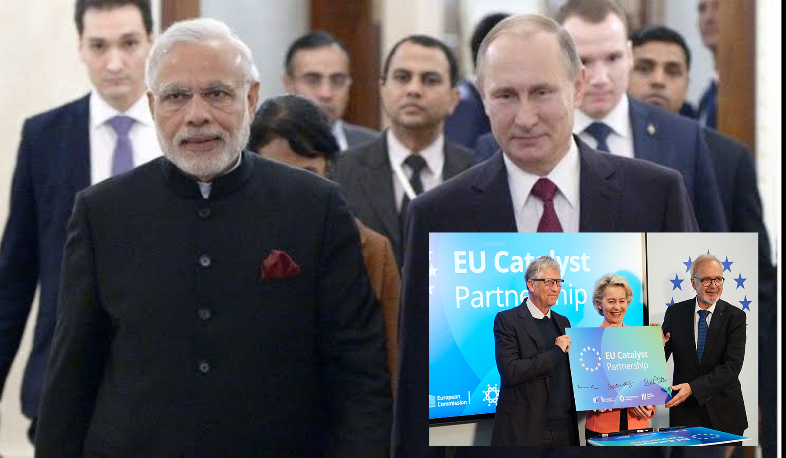The EU and the West seem to be looking at every possible way to meddle and disrupt the India-Russia bilateral relations. This time, it has attempted a technological interruption through Microsoft. The conflict began in mid-July after the European Union imposed sanctions on India’s Nayara Energy due to its Russian ownership ties—Rosneft holds a 49% stake in the Indian energy major.
Despite these EU sanctions not having any legal effect in India. India brushed aside the sanctions and hit back with its remarks that it does not bother with the double standards of the EU and will continue operations. Now, the West seems to have attempted a different approach after Microsoft halted access to licensed tools and platforms used by Nayara, including Outlook, Teams, and other Microsoft 365 services.
The Indian Courts in response have issued a formal notice to Microsoft Corporation in response to a petition filed by Nayara Energy, following the abrupt suspension of the company’s access to Microsoft’s digital services.
Nayara is a key player in India’s energy sector, operating a 400,000-barrel-per-day refinery in Gujarat, India. The company has claimed that the suspension was unilateral, unjustified, and damaging—with no legal compulsion backing the move in either Indian or U.S. law. The firm emphasized that it had met all licensing terms and payments.
The company claims that Microsoft’s move was “unilateral” and made without consultation. “Microsoft is currently restricting Nayara Energy’s access to its data, proprietary tools, and products—despite these being acquired under fully paid-up licenses,” the company said in a statement.
In response, Nayara Energy has filed a legal petition with the Delhi High Court, seeking an interim injunction and immediate restoration of services. In its petition, the company says that the aim is to “safeguard its rights and ensure continued access to essential digital infrastructure.”
Indian Courts step in
In its petition to the Delhi High Court, Nayara Energy argued that Microsoft’s actions amounted to “dangerous corporate overreach” and sought an interim injunction to restore services. On July 28, the High Court admitted the case and issued a notice to Microsoft, demanding a response and urging both parties to explore an amicable interim resolution.
The court, while recognizing the urgent operational need of Nayara, scheduled the next hearing for July 30 and urged Microsoft to uphold contractual obligations in the meantime.
The digital blackout significantly disrupted Nayara’s operations. The company was forced to scale down refinery output to 70–80% due to coordination challenges and data inaccessibility. Communications and internal workflows were temporarily shifted to Rediff.com, an Indian IT provider.
Microsoft tracks back
On July 30, just before the scheduled court hearing, Microsoft restored Nayara’s access to its digital services. While no public statement was made by Microsoft on the rationale behind the reversal, Nayara’s legal team informed the court of the development, prompting the judge to defer deeper interim relief deliberations.
Microsoft has declined to issue a public comment on the matter. Despite multiple requests for clarification, the company offered no statement explaining its decision to suspend—or later restore—Nayara’s services.
The sudden restoration has sparked a broader debate: Was this a compliance misstep corrected under legal pressure, or an attempt at coercive leverage in the shadow of geopolitical sanctions?
Nayara’s case underscores a growing concern: multinational technology firms—especially those operating cloud infrastructure—can unilaterally disrupt essential services with significant economic consequences.
Microsoft may have acted out of sanctions compliance caution, seeking to align with EU regulatory norms even outside EU jurisdiction. But critics argue this is a dangerous precedent, particularly for Indian companies that may now face geopolitical crossfire via foreign-controlled tech infrastructure.
Policy experts and industry analysts have highlighted the incident as a message for Indian corporates. Many are advocating for greater adoption of homegrown technology platforms Zoho, for instance, as alternatives to global providers, while cutting off from Western providers, as the tech interruptions may be used anytime in any kind of non-conciliatory scenario.
It is also a warning to the world that the Western lobbies will attempt every way they can to ‘coerce’ their wishes on any nation-state, regardless of their sovereign geopolitics. India is a huge power and hence has averted these attempts; however, for many smaller nations, such tactics may serve as a very dangerous tool that may forcefully push their policies by the West.








